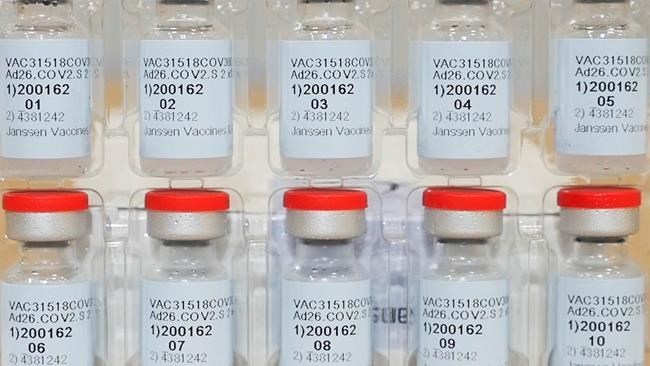
This Dec. 2, 2020, file photo provided by Johnson & Johnson shows vials of the COVID-19 vaccine in the United States. THE CANADIAN PRESS/AP-Johnson & Johnson via AP
April 14, 2021 - 8:52 AM
News of reported blood clots in a handful of American recipients of the Johnson & Johnson COVID-19 vaccine has prompted some to wonder why certain brands of the jab are potentially causing the rare side effects while others aren't.
Experts say while the vaccines are safe and effective, it's worth looking into whether the technology used — a non-replicating viral vector that differs from the mRNA shots from Pfizer-BioNTech and Moderna — might have something to do with it.
Johnson & Johnson is the second viral vector vaccine to be investigated for links to infrequent clotting events after similar investigations last month in Europe and Canada into Oxford-AstraZeneca.
But what is it about the viral vector technology that's possibly leading to clotting issues in a small minority of people?
"That's one of the million-dollar questions we're trying to figure out," said Linda Dresser, an assistant professor in the University of Toronto's pharmacy program.
"Is it something about the vaccines? Is it something about the viral vector compared to the messenger RNA (of Pfizer-BioNTech and Moderna)? ... Those are questions being looked at (by researchers)."
The U.S.-based Centers for Disease Control and Prevention and Food and Drug Administration recommended pausing the use of Johnson & Johnson on Tuesday as regulators investigate reported clots in six women — out of 6.8 million doses given — that happened within days of receiving the vaccine.
Kelly Grindrod, an associate professor at the University of Waterloo’s School of Pharmacy, says the clotting could potentially be related to the way some peoples' bodies are reacting to the viral vector within these vaccines — the non-harmful virus that's used to carry the coronavirus's genetic code.
All of the approved COVID vaccines train the body to recognize the spike protein of the coronavirus. But the viral vectors do it differently than the mRNA jabs.
Johnson & Johnson and AstraZeneca use harmless versions of cold viruses as vessels, carrying instructions for our cells to make the protein. The immune system then recognizes that to produce antibodies.
Pfizer and Moderna dump the genetic code, packaged around a fat coating, directly into the cells.
"There's probably something about that viral vehicle that when it's given to a million people, we might start to see a handful of cases," Grindrod said. "And that's what we're seeing."
The why is still to be determined, however.
Sumon Chakrabarti, an infectious disease doctor in Mississauga, Ont., says any theory is just "speculation right now," but added some scientists have wondered whether the clotting could be solved by lowering the dose, just as AstraZeneca mistakenly did in early versions of its clinical trials.
"One interesting theory on why the half-dose worked better than the full dose (in those trials) was that if you gave too much of the viral vector, your immune system was detecting it and destroying it," he said. "But if you gave a half-dose, that was enough to evade being destroyed and it could get into your cells to do its job."
The viral vector technology is relatively new to human vaccines.
Grindrod says it was first successfully used in the Ebola inoculation, which was approved in the U.S. in 2019, but the CDC notes it's also being studied in vaccines against infectious diseases such as Zika, the flu and HIV.
Grindrod says we haven't seen blood clotting as a side effect of the Ebola vaccine, though that could be because not enough people have taken it.
"To be able to find this with the viral vectors we had to vaccinate millions of people," she said. "(There are) side effects that don't show up in a clinical trial of 50,000. ... You have to have a pretty strong system to catch side effects that are one in a million."
The early reports from Johnson & Johnson recipients appear similar to the rare type of clotting disorder that European authorities say could be linked to AstraZeneca.
Data published in the online journal Science onSunday showed 222 suspected cases of clotting among AstraZeneca recipients in Europe — out of 34 million doses administered — and 30 deaths from the disorder, which is characterized by clots and low platelet counts.
Canada reported its first case of a clot possibly associated with the jab on Tuesday. More than 700,000 doses of the vaccine have been administered in the country.
The European Medicines Agency says the benefits of receiving AstraZeneca outweigh the potential risks.
And Canadian experts feel the same.
Grindrod noted the chance of getting a blood clot from COVID is higher than the danger of getting one from the vaccine itself.
While Dresser understands people worry about clotting, however rare the side effect may be, she says now's not the time to be vaccine shopping as parts of Canada hit the peak of a third wave.
Canada, which approved the company's jab in early March, is scheduled to receive its first shipment by the end of this month. Health Canada said Tuesday it is investigating the latest reports from the U.S.
"As a society we don't have that time to waste," she said. "I'm still of the philosophy of: take the first vaccine that's offered to you. They are all safe and effective."
This report by The Canadian Press was first published April 14, 2021.
News from © The Canadian Press, 2021